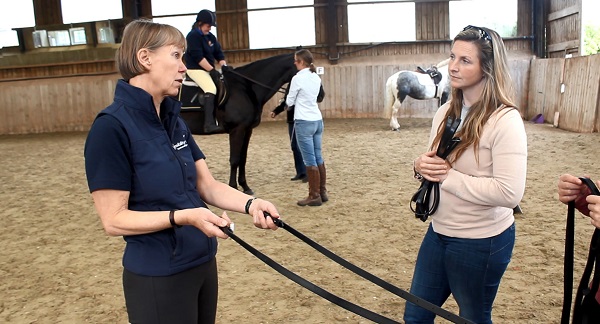Posted: 23rd August 2019 | Back to news feed
Dispelling the Myths – How Your Centre Can Teach Disabled Riders
Accessibility Mark is providing riding schools with the knowledge and confidence to teach disabled riders.
The revolutionary scheme, introduced by Riding for the Disabled Association (RDA) and the British Equestrian Federation, provides training and assessment to ensure centres can provide a first class service.

Many establishments still wrongly believe that they are unable to teach disabled riders, so here we dispel some of the myths and take a look at why Accessibility Mark accreditation could be good for business.
Dispelling the Myths
‘We don’t have specialist equipment.’ – Wherever possible it is recommended that regular equipment should be used, however some riders can at times struggle to grip the reins properly or use the reins to balance and this is where centres can take advantage of specialist or modified equipment to ensure the safety of both horse and rider. This is often just a simple modification to the reins.
‘We don’t have the training to teach disabled riders.’ – To meet the criteria to become an Accessibility Mark accredited centre, instructors must be qualified to at least UKCC Level 2 or BHS Stage 3 in Complete Horsemanship or equivalent. An Accessibility Support Officer (ASO) conducts a training day with all new centres, focusing on good practice for different mounting techniques, leading and side walking and suitable lesson planning.
‘Our horses might not be suitable.’ - There is no such thing as the perfect RDA or Accessibility Mark horse. Genuine all-rounders are ideal and it is important to recognise that a lot of the challenges that the horses may face with riders with disabilities are no different to that of any range of riding school clients.
‘We don’t have the right facilities.’ - Centres often assume that their facilities will not meet the guidelines if they are not fully accessible to wheelchair users, but limiting factors would not rule a centre out for accreditation. It is up to individual centres to decide the level of disability that they can work with.
The Benefits to Your Business
An extra avenue for business growth -In a tough economic climate, Accessibility Mark is providing equestrian centres with another avenue of revenue. This also provides an opportunity to fill the gaps during the daytime when centres can have a lull in customers, particularly in school term-time.

Support from a well-respected organisation – All Accessibility Mark centres receive ongoing support from their ASO and RDA. A good relationship between the centre and its ASO, with open dialogue, is essential to making sure clients gain maximum benefit.
Access to RDA Resources – The charity has a wealth of resources at the disposal of centres, including training packs, advice sheets and certificates to recognise achievement.
Goodwill in the community – Accessibility Mark provides an opportunity to work with organisations within the community and through your local council.
Help with raising awareness of your accreditation – All Accessibility Mark centres are offered marketing support to help promote their accreditation and raise awareness of the scheme.
There are currently 53 Accessibility Mark-approved centres across the country.
To find out more about becoming an Accessibility Mark centre visit www.myrda.org.uk
The Equestrian Index newsfeed is compiled from articles submitted by advertising members and expresses the opinions of those members. Watsons Directories Ltd shall not be held liable for any inaccuracies or mis-statements therein.